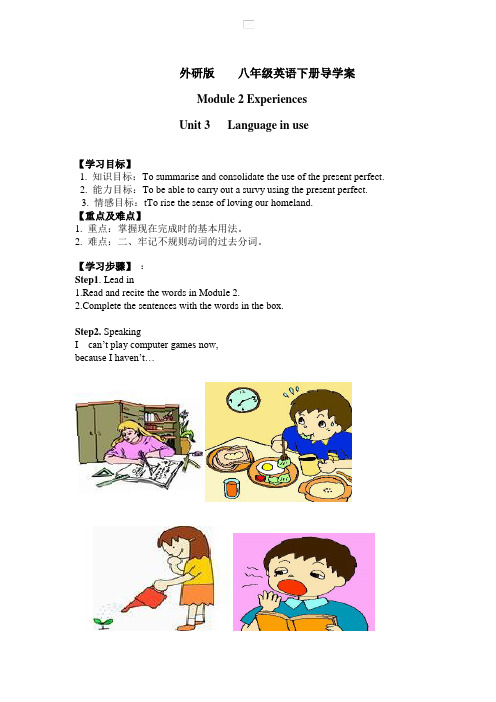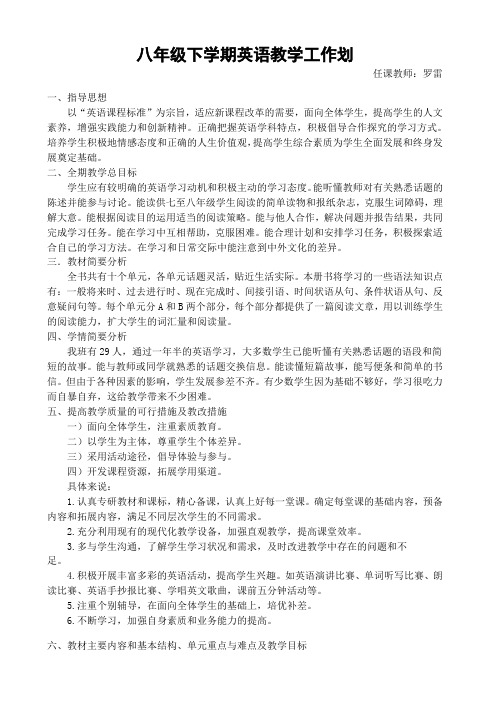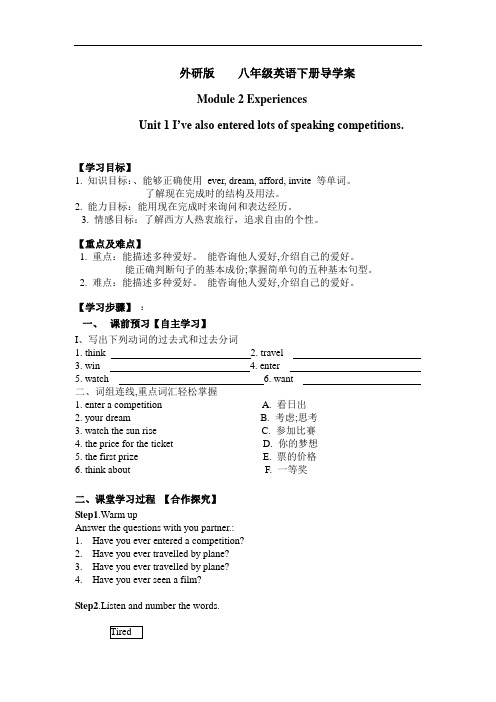八年级下 unit2 导学案
新外研版八年级英语下册导学案Module 2-Experiences(Unit1-Unit3)

外研版八年级英语下册导学案Module 2 ExperiencesUnit 3 Language in use【学习目标】1. 知识目标:To summarise and consolidate the use of the present perfect.2. 能力目标:To be able to carry out a survy using the present perfect.3. 情感目标:tTo rise the sense of loving our homeland.【重点及难点】1. 重点:掌握现在完成时的基本用法。
2. 难点:二、牢记不规则动词的过去分词。
【学习步骤】:Step1. Lead in1.Read and recite the words in Module2.plete the sentences with the words in the box.Step2. SpeakingI can’t play computer games now,because I haven’t…Step3. Write a questionnaire about your experiences.Have you ever …had a Western meal?lived in another city?entered a singing competition?travelled by train?travelled to the seaside?tried seafood?cooked dinner for your parents?------Yes, I have. / No, I haven’t.Step4 Complete the sentences.1. He/She _____________________ a Western meal.2.He/She ______________________ in another city.3.He/She ______________________ a singing competition.4. He/She _____________________ by train.5.He/She ______________________ the seaside.6.He/She ______________________ seafood.7.He/She ______________________ for his/her parents.Step5. Complete the postcard. Use the list of Things to do in China to help you.Things to do in China!------go to Beijing,see the Beijing Opera,climb the Great Wall,eat Beijing duck,visit the Palace MuseumStep6 Activity4Dear David,I’m having a wonderful time in China. I’ve done so many things!I’ve__________________________________________________________________________________ ___________________________________________________________ There’s only one thing I haven’t don e :I...______________________________________Bye for now,RobStep7. Complete the sentences with the words in the box.afford, competition, pronounce, spell, tower1.I wrote a story for a(n) ___________ in my English class and I won a prize.2.Alice can _______ very well, and what's more, she can write beautifully.3.Some English words are difficult to ____________.4.We visited an ancient palace with a tall_______ and a beautiful garden.5.Mary wants to visit the US, but the plane tickets are very expensive and she cannot ______ to go.Step8.Listen and check (√) the correct answer.Places visitedPeople China Europe USAWinnieDianaBobStep9. Listen again and answer the questions.1. ( ) How many times has Winnie been to the US?A. two timesB. three timesC. four times2. ( ) Where would Diana like to go again?A. the USB. EnglandC. China3. ( ) Which part of China has Diana travelled around?A. NorthB. SouthC. West4. ( ) How did Diana travel there?A. by boatB. by trainC. by plane5. ( ) Has Bob ever visited Germany?A. No, he hasn’tB. Yes, he has【知识结构】(一)、Grammar现在完成时如果你想说“我已经看过某部电影,所以不想看了” “某人曾经做过什么事情”等等,该如何表达呢?首先请看下面的句子:(1)I have seen the f ilm. I don’t want to see it again.(2) Have you ever read a travel brochure?(3) I have never visited the USA.以上句子的谓语动词有一个共同的特点就是“have/has+动词的过去分词”, 用于表示在以前的某个时间曾经做过的、发生的事情,这种行为对目前有某种影响,如(1); 还可以表示到目前为止曾经经历或没经历的事情,如(2)(3)。
人教版英语八年级下册导学案

Unit4Section A一、学习目标:1) Important words: mad, anymore, message, suppose, hard-working2) Important phrases: watch soap operas, be supposed to do, first of all, pass on, sth. happen on …3) Important Sentences①She said she was mad at Marcia. ②She said she was having a party for Lana.③What happened on “Young Lives” last night? ④You are supposed to meet at the bus stop to return it.4) Grammar: 直接引语和间接引语二、学法指导:运用任务型学习,驱动学生掌握直接引语与间接引语之间的转化三、学习过程:Step1自学单元语法:(直接引语和间接引语)(一) 直接引语和间接引语的含义:引述别人的话时,一般采用两种形式:一是引用别人的原话,两边用引号标出,称为直接引语;二是用自己的语言转述别人的话,称为间接引语。
间接引语在句中实际上就是宾语从句。
(二) 直接引语变间接引语的方法:1.从句人称的变化:由直接引语变间接引语时,从句的主语人称要遵循一主、二宾、三不变的原则。
1)直接引语的主语是第一人称时,变为间接引语时要和主句的主语保持一致。
2)eg:①They said,“We will go there by bus”。
→They said they would go there by bus.3)②He said,“I am visiting my aunt next week.”→He said that he was visiting his aunt next week.2)如果直接引语的主语是第二人称,变为间接引语时要与主句的宾语保持一致。
八下英语导学案人教版答案

八下英语导学案人教版答案Unit 1Times are ChangingⅠ. go well with 2. meet up with 3. called on 4. fly up 5. on the wayⅡ. 1. What 2. How 3. How often 4. How many 5.Who/WhoeverⅢ.1-5D B C A E 6-10F J G I HⅣ. 1-5C E D B AⅤ. 1. on display 2. had better 3. brought back 4. to give away 5. to play withⅥ. 1. does; enjoy 2. Did; hear 3. doesn’t; talk 4. Did; travelⅦ. 1. take off 2. make a speech 3. show off 4. join in 5. run afterⅧ. 2. on display 3. ran after 4. is changing 5. saw offUnit 2Lessons from the PastⅢ.1-5B D F A C 6-10H G E K JⅣ.is known for; being 2. are proud of 3. were led by 4. have been; since 5. Often; surprisesⅤ. 1. according to 2. take up 3. so that 4. besides5. make upⅦ. 1. whether; or 2. neither; nor 3. both; and 4. not only; but alsoⅧ. | 不同凡舞的 | 经历; 在战争中; 为; 胜利; 而战Ⅸ. 1. fought against 2. besides 3. both; and 4. neither; nor 5. Not only; but alsoUnit 3CommunicationⅡ. 1. How tall 2. What kind of 3. How many;are there 4. What color 5. How muchⅢ.1-5A D E B C 6-10I G H F JⅤ. 1. by;living 2. by; learning 3. It; possible; get 4. as; possible 5. after; goingⅥ. 1. was trying; failed 2. were chatting 3. makes; laugh 4. doesn’t; writeⅦ. 1. starts up 2. looked up to 3. turn down 4. come up with 5. looking forⅧ. 1. are chatting 2. gives up 3. looked up 4. come up withUnit 4Wildlife ProtectionⅠ. 1. put off 2. came up with 3. sign up (for) 4. make up 5. work outⅡ. 1. 和 . . . . . . 在一起; 2. 拥抱自然; 3. 在未来; 4. 长至; 5. 产生危险Ⅲ. 2. separated; from 1. grow up 3. protecting; from 4. welcomed; into 5. inspired; withⅣ. 1-5D E C A BⅤ. 1. to give up 2. taking care of 3. to make up 4. give away 5. bringing backⅥ. 1. asked; to follow; refused 2. is planning ; will start 3. was told ; not to go 4. wanted; to go, toldⅦ. 1. make up 2. looking after 3. go over 4. take care of 5. give awayⅧ. 2. took care of 3. give up 4. looked afterUnit 5FilmsⅢ. 1-5A B C D FⅣ. 1. are enjoyed by 2. as; as 3. The more; the more 4. would rather; than 5. So; thatⅤ. 1. are; taken 2. is being; looked 3. is used 4. to entertain 5. to makeⅥ. 1. were being watched 2. enjoy;playing 3. are; taught / have; taught 4. is known; meanⅦ. 1. turned down 2. made up 3. take off 4. keep on 5. went offⅧ. 1. are being taught 2. turned up 3. makes upUnit 6I'm watching TVⅡ. 1. How long 2. How often 3. How many; did 4. How much; isⅢ.1-5B A E C D 6-10G F J H IⅣ.1-5C B A E DⅤ. 1. in trouble 2. get; a sunbath 3. flew away 4. to express; anger 5. for relaxing(笑)。
江苏新教材牛津英语八年级下Unit 2 Travelling Grammar

Daniel and Millie are chatting at a weekend. Complete their conversation with the correct forms of the verbs in bracket.
D: I see. By the way, shall we invite Andy to go for a picnic tomorrow? M: Andy isn’t here this weekend. He and have gone (go) to the his parents (7) _________ countryside. They will be back tomorrow afternoon.
Have been to/in have gone to 1.A: Where’s Jim, Li Lei? has gone to B: He ______________his school library. have been in 2.The Greens _____________China for three years. have been to 3.We _____________the Great Wall twice. It’s very beautiful. Have 4. _______you ever __________ been to Shanghai? gone to the 5. Lily isn’t in the classroom. She has __________ lab. been in 6.________Lucy __________ China since 5 years Has ago.
Translation: 1.A: 我昨天没看见你.你去哪儿了?B:我去电影院了. A:你什么时候去电影院的?B:昨天下午. A: I didn’t see you yesterday. Where have you been? B: I have been to the cinema. A: When did you go to the cinema? B: Yesterday afternoon. 2.A:Tony曾经去过法国吗?B:是的. A:他去过埃菲尔铁塔吗?B:没有.
八年级英语下册全册导学案

八年级下学期英语教学工作划任课教师:罗雷一、指导思想以“英语课程标准”为宗旨,适应新课程改革的需要,面向全体学生,提高学生的人文素养,增强实践能力和创新精神。
正确把握英语学科特点,积极倡导合作探究的学习方式。
培养学生积极地情感态度和正确的人生价值观,提高学生综合素质为学生全面发展和终身发展奠定基础。
二、全期教学总目标学生应有较明确的英语学习动机和积极主动的学习态度。
能听懂教师对有关熟悉话题的陈述并能参与讨论。
能读供七至八年级学生阅读的简单读物和报纸杂志,克服生词障碍,理解大意。
能根据阅读目的运用适当的阅读策略。
能与他人合作,解决问题并报告结果,共同完成学习任务。
能在学习中互相帮助,克服困难。
能合理计划和安排学习任务,积极探索适合自己的学习方法。
在学习和日常交际中能注意到中外文化的差异。
三.教材简要分析全书共有十个单元,各单元话题灵活,贴近生活实际。
本册书将学习的一些语法知识点有:一般将来时、过去进行时、现在完成时、间接引语、时间状语从句、条件状语从句、反意疑问句等。
每个单元分A和B两个部分,每个部分都提供了一篇阅读文章,用以训练学生的阅读能力,扩大学生的词汇量和阅读量。
四、学情简要分析我班有29人,通过一年半的英语学习,大多数学生已能听懂有关熟悉话题的语段和简短的故事。
能与教师或同学就熟悉的话题交换信息。
能读懂短篇故事,能写便条和简单的书信。
但由于各种因素的影响,学生发展参差不齐。
有少数学生因为基础不够好,学习很吃力而自暴自弃,这给教学带来不少困难。
五、提高教学质量的可行措施及教改措施一)面向全体学生,注重素质教育。
二)以学生为主体,尊重学生个体差异。
三)采用活动途径,倡导体验与参与。
四)开发课程资源,拓展学用渠道。
具体来说:1.认真专研教材和课标,精心备课,认真上好每一堂课。
确定每堂课的基础内容,预备内容和拓展内容,满足不同层次学生的不同需求。
2.充分利用现有的现代化教学设备,加强直观教学,提高课堂效率。
外研版英语八年级下册Module 2导学案(3节)

外研版八年级英语下册导学案Module 2 ExperiencesUnit 1 I’ve also entered lots of speaking competitions.【学习目标】1. 知识目标:、能够正确使用ever, dream, afford, invite 等单词。
了解现在完成时的结构及用法。
2. 能力目标:能用现在完成时来询问和表达经历。
3. 情感目标:了解西方人热衷旅行,追求自由的个性。
【重点及难点】1. 重点:能描述多种爱好。
能咨询他人爱好,介绍自己的爱好。
能正确判断句子的基本成份;掌握简单句的五种基本句型。
2. 难点:能描述多种爱好。
能咨询他人爱好,介绍自己的爱好。
【学习步骤】:一、课前预习【自主学习】I、写出下列动词的过去式和过去分词1. think2. travel3. win4. enter5. watch6. want二、词组连线,重点词汇轻松掌握1. enter a competition A. 看日出2. your dream B. 考虑;思考3. watch the sun rise C. 参加比赛4. the price for the ticket D. 你的梦想5. the first prize E. 票的价格6. think about F. 一等奖二、课堂学习过程【合作探究】Step1.Warm upAnswer the questions with you partner.:1. Have you ever entered a competition?2. Have you ever travelled by plane?3. Have you ever travelled by plane?4. Have you ever seen a film?Step2.Listen and number the words.1. Lingling has visited / hasn’t ever visited the US.2. Betty has asked / hasn’t asked her parents.3. Lingling has travelled / hasn’t travelled by plane.Step4. 读对话找出现在完成时的句子。
Unit 2 What time do you go to school 导学案(含答案)

❶ at作介词,无论表示时间点还是空间点,at都用于“小而具体”的名词前,比如时间表达“在几点”,地点表达“在哪儿”。
eg:at the moment此时此刻at nine o'clock在9点at noon在中午
❷ in的本意是“在……之内”,表示时间的时候,指的是在一个比较长的时间段之内,表示地点的时候,表示在地点名词内部。
【辨析】:work与job
work
不可数名词
泛指抽象意义的工作。
job
可数名词
指具体的某种工作或职业。
eg:My brother has a job(n. ). He is a worker(n. ) and works(v. ) in a factory. He likes his work(n. ) very much.我哥哥有一份工作。他是一名工人,在一家工厂工作。他非常喜欢他的工作。
7.because we have a shower schedule.
____________________________________________________________________
8.He works at a radio station.
____________________________________________________________________
5.What time do you usually take a shower, Rick?
____________________________________________________________________
8年级下册英语导学案Unit2

学校:班级:小组:姓名:小组评价:教师评价:Unit 2 I’ll help to clean up the city parks.第一课时 Section A(1a-1c)【学习目标】1.会使用重点单词cheer,volunteer...,重点短语clean up,cheer up,give out...2.会使用“I could...”、“I hope to...”等句型,向别人提供协助。
3.能听懂、能说出“协助他人,参加社会公益活动”的相关话题。
【学习重难点】1.掌握cheer,volunteer...,clean up,cheer up,give out...的用法。
2.用重要句型向别人提供协助。
【学法指导】1.查词汇表,自学本课时新词汇。
2.朗读1b,勾画有用的表达:clean up,cheer up,give out,at the food bank3.互助学习,练习对话。
【自学互助】一.温故知新:和同伴议一议,讨论回答以下问题。
1.Do you think helping other is great?2.What will you do if you are a volunteer? Please give some examples.二.翻译以下短语。
1.清扫__________2.分发___________3.使快乐;振奋____________________4.sick children________________5.at the food bank__________________6.after-school study program______________________三.通过互助学习后,我的疑惑是_____________________________________________________________________________ 【展示互导】看图说,仔细听,认真评通过观察1a图片中你能够协助人们的方式,然后列出更多其他方式。
- 1、下载文档前请自行甄别文档内容的完整性,平台不提供额外的编辑、内容补充、找答案等附加服务。
- 2、"仅部分预览"的文档,不可在线预览部分如存在完整性等问题,可反馈申请退款(可完整预览的文档不适用该条件!)。
- 3、如文档侵犯您的权益,请联系客服反馈,我们会尽快为您处理(人工客服工作时间:9:00-18:30)。
The water is hot enough.
3. enough…to足以做某事。
He is old enough to join the army.
他足够大可以参军了。
5、but I don’t want to surprise him.
(1)Surprise可用作名词也可用作动词。用作动词时意为“使(某人)惊奇或吃惊”,用作名词时意为“惊奇,吃惊”
(2)他们正为玩电子游戏而争吵。
lend sth. to sb.把某物借给某人
borrow sth. from sb.是指该句的主语从别人处(往里)借进某物
例:He borrowed the dictionary from Lucy yesterday.他昨天从露西处借了那本字典.
lend sth. to sb. = lend sb. sth.是指该句的主语把某物(往外)借给别人用
3、与某人争吵_____________ 4、enough money_____________
5、给某人写信_____________ 6、a ticket to a ball game_____________
三、教师导学
1、情态动词的使用
(1)情态动词和其他动词连用,可表示说话人的语气。情态动词可表达建议、要求、可能和意愿等。情态动词没有人称和数的变化。
2、What should I do? You should write him a letter.
What should he do? Maybe he should say he’s sorry.
What should they do? They should talk about their problem.
固定搭配:be surprised at sth. be surprised to do sth , in surprise,(惊讶地) , to one’s surprise. (使某人惊讶的是)
We were surprised at the result.
We were surprised to hear the result.
Out of ---还有其他含义:
(1)表示“不再…;失去…;缺乏、用光”
Out of use不再使用;out of work失业;
out of danger脱离危险;out of control失去控制
(2)out of还有“从…到外,在…的范围外”
Don’t look out of the city.不要往窗外看。
He told me some surprising news. (定语)他告诉我一些令人惊讶的消息。
The result is surprising. (表语)结果是令人惊讶的。
(3)surprised是形容词,在句中做表语,其后多接动词不定式或从句。
I was surprised to see him there.
(2)a ticket to a ball game.一张球赛的票。
介词to表示“关联,联系,到”类似的结构还有:
The key to the door. (门的钥匙) the way to the post office.
The answer to the question. (问题的答案)
7、I need to get some money to pay for summer camp.
A. happy B. upset C. tired D. excited
( )8. Eve and Sally like to talk _____ the phone.
A. in B. on C. at D. with
( )9. -- Your shirt is the same ______ Jim's.-- We are good friends.
(1)summer camp夏令营
(2)an.我花了五元钱。
Pay for +某物:为某物支付钱。
I don’t have enough money to pay for the car.
Pay +钱+物为…付…
I paid 60 Yuan for the dictionary.
2.情态动词could /should的用法。
3.Why don’t you … ?结构表建议的运用。
4.如何谈论问题及提出建议。
重难点
1.should /could情态动词的用法。
2.如何提出建议。
学习目标
掌握下列短语和句型。
短语
1.want sb. to do sth.2.play one’s stereo3stay at home
(2)情态动词should与could的用法见练习册19页重点导析。
2、argue v.争论;争吵argument n.争论,争吵
(1)argue with sb.与某人吵架
Iargued with my best friend.我和我的好朋友吵架了。
(2)argue about sth.为某事而争吵
He is always arguing with his wife about money.
3、be in style时髦的,流行的
be out of style过时的,不时髦的
(1)Her new dress is in style.她的新裙子很时髦
(2)Those clothes are out of style.那些衣服过时了。
He looked at me in surprise.
To my surprise, he give two tickets to the ball game.
6、You could give him a ticket to a ball game.
(1)give sb. sth = give sth to sb.把某物给某人Please give it to me.
教师寄语
Always do your best.What you plant now,you will harvest later.
凡事都要尽力去做,因为付出才会有收获。
一、自主学习
1、课前准备
当别人有了麻烦,我们该怎么用英语来询问:
给别人提建议的句型有:
二、预习检测
试着翻译下列短语:
1、打电话给某人_____________ 2、过时的;落伍的_____________
(2) The fat woman ____ keep exercising.
(3) You ____ act on the teacher’s device.
(4) She ___ not ride a bike last year.
3.根据汉语意思玩成句子
(1)我没有足够钱买车。
I don’t have ______ ______ to buy a car.
( )2.I argue ______ my best friend
A .with B. about C. at D. and
( )3.Could you give me _____ advice?
A. some B. any C. many D. a lot
( )4.The boy is ______to go to school .
A. enough old B. enough young
C. old enough D. young enough
( )5. – What’s wrong? -- My clothes are out of style. What ____ I do?
A. will B. should C. may D. must
(3)spend花费在句中主语是人
The girl often spends three Yuan every day.
Pay…on在…上花了…时间或金钱
She often much money on her clothes.
Pay…(in) doing sth.花时间,金钱做某事
8、borrow sth. from sb.从某人处借进某物
四、当堂巩固练习
1、翻译下列句子
你怎么了?
我的衣服过时了。
我和我的朋友吵架了。
也许你该写信给他。
2、背诵Grammar Focus里的句子。
3、单项选择。
( )1.My parents want me _____at home every night
A. stay B. staying C. to stay D. staies
He lives five miles out of the city他住在城外五英里的地方。
4、I don’t have enough money
enough意为“充足的,足够的”,既可以做形容词,也可以做程度副词。
1.做形容词修饰名词时放在名词前:
We have enough food to eat.我们有足够的食物吃。
9、No, he doesn’t have any money,either .
①eitheradv.(用于否定句)也
I can’t play chess. She can’t, either.我不会下国际象棋,她也不会。
②too也(用于肯定或疑问句)
I’m a teacher.He is a teacher, too.我是老师,他也是老师。
常用的情态动词有:can, could, may, might, must, shall, should, will, would这九大情态动词。情态动词后跟动词原形。
Icanplay the guitar.
